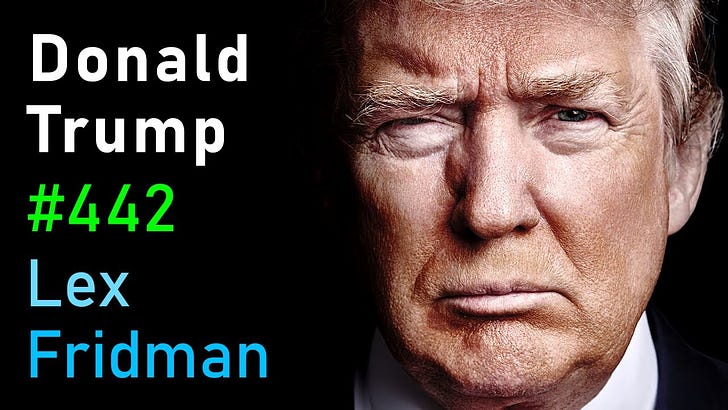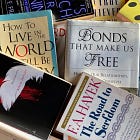Peace, Liberty and Prosperity Walk Together
Having a peaceful heart doesn't mean having a mentality of naive surrender.
“Liberty, as we all know, cannot flourish in a country that is permanently on a war footing, or even a near war footing. Permanent crisis justifies permanent control of everybody and everything by the agencies of central government.”—Aldous Huxley, Brave New World Revisited
Lex Fridman is a research scientist at MIT and a popular long-form podcaster. Recently Fridman interviewed Donald Trump. If you can’t imagine Kamala Harris sitting with Lex for a free-wheeling, unscripted conversation, I can’t either.
Fridman has a respectful but let’s get to the point interviewing style. He began with, “I don’t know if you know this, but some people call you a fascist.”
Peace and the threat of nuclear war were part of the conversation. Trump is sure he can get a deal done that both Zelensky and Putin can accept. A deal remains to be seen, but Trump is keenly aware of the destruction that current wars in Ukraine and Israel have brought and the existential threat to humanity if current conflicts spread.
On a seemingly different topic, Trump observed that sports champions he knows personally have a different mindset from those with equal talent; champions go deep within to get the job done. Does Trump see himself as a peace champion? Is there such a thing as a peace mindset?
Robert Kennedy Jr. believes Donald Trump is more capable of advancing global peace than Kamala Harris, which is one reason he endorsed Trump.
When I listen to Kennedy, it becomes apparent that he embodies what the Arbinger Institute calls "a heart at peace.” Having a peaceful heart doesn't mean having a mentality of naive surrender.
In their book The Anatomy of Peace, the Arbinger Institute distinguishes two fundamental ways of being in the world, leading to different ways of interacting with other people: “We can see others either as people, who matter like we ourselves matter, or as objects that don’t matter like we matter. When we see others as counting like we ourselves count, our hearts are at peace. When we see others as not counting like we count, our hearts are at war.”
A heart at peace is a state of mind; it doesn’t mean that force isn’t at times necessary. We may be forced to defend ourselves, but we are never “forced to despise, to rage, to denigrate, to belittle. No one can force a warring heart upon us. When our hearts go to war, we ourselves have chosen it.”
As you may remember from our study of Bonds That Make Us Free, C. Terry Warner established the Arbinger Institute and was heavily influenced by philosopher Martin Buber.
For more on Warner’s philosophy, see Mindset Shifts U's archived sessions on Bonds That Make Us Free.
In his best-known work written in 1923, I and Thou, Buber observed we are always choosing between two mutually exclusive ways of seeing the world: “I-Thou” or “I-It.” We mostly see through the “I-It” lens; others are seen as less than us, either as objects that help us or obstacles that get in our way. In the “I-It” mode, just as with people, with nations too, “suspicion on one side breed[s] suspicion on the other.”
Think for a moment how quickly you get irritated in a long supermarket line if the cashier seems to move slowly. We are not the center of the universe; we can ignore the As My World Turns soap opera being narrated in our heads.
In contrast, through the lens of “I-Thou” we see others as individuals, as people as important as we are. We take an out-breath and humanly connect with the cashier who has problems and difficulties as real as our own. Seeing through the “I-Thou” lens, like seeking peace, begins with it a commitment to a mindful process. As we becoming aware of our own attitudes and behaviors, our desire to change someone else fades away.
While it is clear that Trump can respond inappropriately to a perceived slight, a character flaw doesn’t have to define him.
Only the most unhinged Trump haters would not be overjoyed at the prospect of peace. “The past doesn’t have to be the future” was the message Trump shared with the North Korean despot Kim Jong-un during their 2018 summit. Trump shared with Kim a video of what was possible with peace.
Only those ignorant of the suffering of the North Korean people would not have their hearts lifted at the prospect of legitimate commerce replacing the country’s flatlined Marxist economy and black-market dealings. Trump offered a future where North Korea could “shake the hand of peace and enjoy prosperity” with the prospect of condos and hotels on beaches in developing North Korea.
Trump understands that peace brings prosperity (I’ll say more about that in a future essay) but Kim is not motivated by anything but his own family’s prosperity and survival.
The video's script delivered the message: “A new world can begin today, one of friendship, respect, and goodwill. Be part of that world, where the doors of opportunity are ready to be opened.”
Perhaps unknowingly the video echoed former President John Quincy Adams's worldview. On the 4th of July, 1821, then Secretary of State John Quincy Adams delivered an address on foreign policy. In that address, he advised America to not go abroad “in search of monsters to destroy” but instead to offer the hand “of honest friendship, of equal freedom, of generous reciprocity.”
The out-of-the-box effort put into the summit with Kim may have failed, but it was worth trying. It may have seeded future possibilities for peace. Despite being advised to flatter Trump, Kim's attempts to appeal to Trump’s narcissism didn't succeed.
Robert Kennedy Jr. has been strongly influenced by John Quincy Adams and his uncle John Kennedy. President Kennedy’s renowned 1963 peace speech has been formative in the world view of RFK Jr.
It's not necessary to love our neighbors in order to live harmoniously, and the same applies to living with other nations. Our commitment, President John Kennedy urged, is to “live together in mutual tolerance, submitting… disputes to a just and peaceful settlement.” Our likes and dislikes are not fixed in stone, and we should never make a potential friend into an enemy.
It may be unrealistic to expect fear to turn to love, but with a shift in mindset, fear can become peace.
President Kennedy pointed to absurd Soviet propaganda about America. Our response, he pleaded, is “not to fall into the same trap as the Soviets, not to see only a distorted and desperate view of the other side, not to see conflict as inevitable, accommodation as impossible, and communication as nothing more than an exchange of threats.” Sixty years later, the views of Americans are shaped by monochromatic, unnuanced views of Russia. The world is less safe and more in danger of nuclear war than at any time since the Cuban Missile Crisis.
In perhaps the most compelling message of the speech, President Kennedy urged Americans to have empathy for the Soviets and understand that they, too, have legitimate security concerns:
[N]o nation in the history of battle ever suffered more than the Soviet Union in the Second World War. At least 20 million lost their lives. Countless millions of homes and families were burned or sacked. A third of the nation’s territory, including nearly two-thirds of its industrial base, was turned into a wasteland, a loss equivalent to the destruction of this country east of Chicago.
Throughout his campaign, RFK Jr. has pointed out America’s “deliberate provocations of Russia going back to the 1990s.” Secretary of State James Baker, under President George H.W. Bush, promised Russia that if they removed their troops from East Germany, NATO would not move “not one inch eastward.” The U.S. bamboozled the Soviets, and the consequences are being felt today.
NATO moved not one inch but 1000 miles to the east. In a 2023 speech, RFK Jr. pointed out “we have surrounded Russia with missiles and military bases, something that we [Americans] would never tolerate.” Kennedy continued:
Politicians and foreign policy “experts” have called for the “disabling and exhaustion of the Russian military and the dismembering of the Russian Federation.” None of these objectives have anything to do with helping Ukraine, which of course was the pretext for our involvement in the war… There is a broader geopolitical agenda and Ukraine is simply a pawn in a proxy war between the United States and Russia. Like teenagers playing World of Warcraft, these warmongers inside U.S. leadership play war games and scenarios and pretend that a nuclear war is winnable; that is a dangerous lie.
Ukraine has suffered devastating damage and a significant loss of life due to a proxy war.
In a warning for our time, President Kennedy said, “Above all, while defending our own vital interests, nuclear powers must avert those confrontations which bring an adversary to a choice of either a humiliating retreat or a nuclear war.”
If Trump’s peacemaking is motivated by his narcissism, I’m OK with that. If Trump sees peace as a means to reduce out-of-control spending, we should all cheer for that. He didn’t cave to Kim Jong-un, and I don’t think he would cave to Putin.
RFK Jr.’s ideas on peace and diplomacy will matter more in the Trump administration if a critical mass of Americans finds their way to a mindset of peace. Who will emerge in 2024 depends on our state of mind and our dominant beliefs.
I'm not saying that we should ignore the base elements of human nature or the dangers of the world, but if that's all we see, we’re going to be stuck forever in the mentality of war. That's where the military industrial complex wants to keep us, and we will reap forever it's poisonous fruits. —RFK Jr.




Good post, hard to argue any of these points, however, please name one politician or celebrity or CEO or billionaire or even a tenured professor at a major university who isn't narcissistic. It comes with the territory.
Shared. A good summation of America & what Trump will bring to his presidency